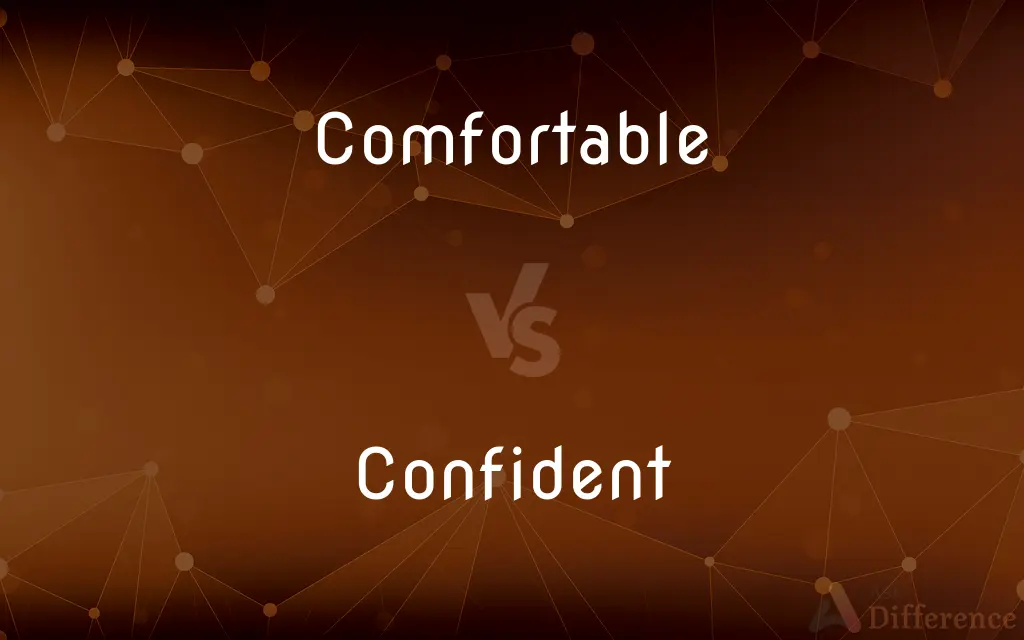Comfortable vs. Confident — What's the Difference?
Edited by Tayyaba Rehman — By Urooj Arif — Updated on April 4, 2024
Comfortable implies a state of physical or emotional ease, while confident denotes a strong belief in one's abilities or qualities.

Difference Between Comfortable and Confident
Table of Contents
ADVERTISEMENT
Key Differences
Comfortable often refers to a state of physical ease, free from pain or constraint, suggesting a situation or environment where one feels relaxed and at ease. On the other hand, confidence relates to the mental or emotional state of believing in oneself and one's powers or abilities, reflecting a sense of self-assurance arising from an appreciation of one's own abilities or qualities.
While being comfortable can involve external factors, such as a cozy environment or secure relationships, confidence is more about internal feelings of self-assuredness and belief in one's own capabilities. Comfort can make one feel at ease in a situation, whereas confidence can drive one to take action or face challenges head-on.
Comfort and confidence can influence each other; for instance, being in a comfortable environment can enhance one's confidence in certain situations. Conversely, having confidence can make unfamiliar or challenging situations feel more comfortable as one believes in their ability to handle them.
People often seek comfort to reduce stress or anxiety, aiming for a peaceful and stress-free state. Confidence, however, is sought to overcome obstacles, achieve goals, and make positive changes, highlighting a proactive approach to life's challenges.
Comfort is about being content with the present situation, avoiding discomfort and pain. Confidence looks towards the future, equipped with the belief in one's ability to succeed or make a positive impact, regardless of the present comfort level.
ADVERTISEMENT
Comparison Chart
Definition
A state of physical or emotional ease, without pain or constraint.
A belief in one's abilities or qualities, showing self-assurance.
Focus
External comfort and ease.
Internal belief and self-assurance.
Goal
To achieve a state of ease and relaxation.
To overcome challenges and achieve goals.
Influence on Action
May encourage staying within familiar, risk-free zones.
Drives taking risks and facing challenges.
Relation to Change
Often associated with maintaining the status quo.
Associated with seeking growth and embracing change.
Compare with Definitions
Comfortable
Feeling content with one’s situation.
He’s comfortable with his decision to change careers.
Confident
Showing a lack of doubt.
She answered the question in a confident tone.
Comfortable
In a state of financial or material contentment.
They are comfortable enough to retire early.
Confident
Feeling certain about the truth of something.
He was confident the plan would work.
Comfortable
Not feeling pain or discomfort.
After the surgery, the patient was finally comfortable.
Confident
Having a strong belief in one’s own abilities.
She was confident she could win the race.
Comfortable
Free from discomfort or stress.
She felt comfortable in her new apartment.
Confident
Displaying assurance in oneself or one’s prospects.
His confident manner impressed the interviewers.
Comfortable
Providing or enjoying physical ease.
The chair was surprisingly comfortable for its design.
Confident
Exuding self-assurance in one’s actions.
He walked into the room with a confident stride.
Comfortable
Providing physical comfort
A comfortable chair.
Confident
Feeling or showing certainty, as of success
Was confident that the venture would be profitable.
Comfortable
Free from stress or anxiety; at ease
Not comfortable about the interview.
Confident
Feeling or showing confidence in oneself; self-assured
A confident driver.
Comfortable
Producing feelings of ease or security
A comfortable person.
A comfortable evening at home.
Confident
(Obsolete) Confiding; trustful.
Comfortable
Sufficient to provide financial security
Comfortable earnings.
Confident
Very sure of something; positive.
I'm pretty confident that she's not lying, she's acting normally.
He was confident of success.
Comfortable
Providing physical comfort and ease; agreeable.
This is the most comfortable bed I’ve ever slept in.
Confident
Self-assured, self-reliant, sure of oneself.
Comfortable
In a state of comfort and content.
What a great guestroom! I'll be quite comfortable here.
Confident
Forward, impudent.
Comfortable
Confident; relaxed; not worried about someone or something.
Confident
Obsolete form of confidant
Comfortable
Amply sufficient, satisfactory.
A comfortable income should suffice to consider oneself rich.
The home team is ahead by a comfortable margin.
Confident
See Confidant.
Comfortable
(obsolete) Comforting, providing comfort; consolatory.
Confident
Having or marked by confidence or assurance;
A confident speaker
A confident reply
His manner is more confident these days
Confident of fulfillment
Comfortable
(obsolete) Strong; vigorous; valiant.
Confident
Persuaded of; very sure;
Were convinced that it would be to their advantage to join
I am positive he is lying
Was confident he would win
Comfortable
(obsolete) Serviceable; helpful.
Confident
Not liable to error in judgment or action;
Most surefooted of the statesmen who dealt with the depression
Demonstrates a surefooted storytelling talent
Comfortable
(US) A stuffed or quilted coverlet for a bed; a comforter.
Comfortable
Strong; vigorous; valiant.
Thy conceit is nearer death than thy powers. For my sake be comfortable; hold death a while at the arm's end.
Comfortable
Serviceable; helpful.
Be comfortable to my mother, your mistress, and make much of her.
Comfortable
Affording or imparting comfort or consolation; able to comfort; cheering; as, a comfortable hope.
A comfortable provision made for their subsistence.
Comfortable
In a condition of comfort; having comforts; not suffering or anxious; hence, contented; cheerful; as, to lead a comfortable life.
My lord leans wondrously to discontent;His comfortable temper has forsook him:He is much out of health.
Comfortable
Free, or comparatively free, from pain or distress; - used of a sick person.
Comfortable
A stuffed or quilted coverlet for a bed; a comforter; a comfort.
Comfortable
Providing or experiencing physical well-being or relief (`comfy' is informal);
Comfortable clothes
Comfortable suburban houses
Made himself comfortable in an armchair
The antihistamine made her feel more comfortable
Are you comfortable?
Feeling comfy now?
Comfortable
Free from stress or conducive to mental ease; having or affording peace of mind;
Was settled in a comfortable job, one for which he was well prepared
The comfortable thought that nothing could go wrong
Was comfortable in his religious beliefs
She's a comfortable person to be with
She felt comfortable with her fiance's parents
Comfortable
More than adequate;
The home team had a comfortable lead
Comfortable
Sufficient to provide comfort;
A comfortable salary
Comfortable
In fortunate circumstances financially; moderately rich;
They were comfortable or even wealthy by some standards
Easy living
A prosperous family
His family is well-situated financially
Well-to-do members of the community
Common Curiosities
Is it better to be comfortable or confident?
Both states have their benefits; comfort is key to relaxation and stress reduction, while confidence is essential for achieving goals and facing challenges.
Can you be confident but not comfortable?
Yes, one can be confident in their abilities yet feel uncomfortable in certain situations or environments that are unfamiliar or challenging.
How does confidence affect decision-making?
Confidence can lead to more decisive and bold decision-making, as one trusts in their ability to make the right choices.
Does confidence guarantee success?
While confidence can increase the chances of success by motivating individuals to take action, it doesn’t guarantee outcomes as external factors also play a role.
How can confidence be built?
Confidence can be built through positive experiences, achievements, learning, and understanding one's strengths and abilities.
Can too much comfort be a bad thing?
Excessive comfort can lead to complacency, limiting personal growth and the willingness to face new challenges.
Why do some people avoid comfort?
Some individuals may associate too much comfort with stagnation and choose to seek challenges to foster growth and learning.
What makes a person feel comfortable?
A person feels comfortable when they are free from pain, stress, or any form of discomfort, often influenced by a familiar and secure environment.
How do societal expectations influence confidence?
Societal expectations can shape how individuals view their abilities, either bolstering or undermining their confidence based on perceived success or failure.
Is it possible to be too confident?
Overconfidence can lead to underestimating challenges and overestimating one’s capabilities, potentially leading to mistakes.
Can comfort lead to happiness?
Comfort can contribute to happiness by providing a sense of security and ease, but it's not the sole factor in achieving overall well-being.
Do comfortable environments always enhance productivity?
While comfort can reduce stress and increase focus, too much comfort might decrease motivation to perform challenging tasks.
Can confidence be mistaken for arrogance?
Yes, overly assertive behavior or excessive self-assurance can sometimes be perceived as arrogance rather than confidence.
How do personal experiences influence comfort and confidence?
Personal experiences, both positive and negative, significantly shape one’s levels of comfort and confidence through learned behaviors and perceptions.
Can confidence change over time?
Confidence can fluctuate based on experiences, achievements, and personal development, and it can be increased through conscious effort and learning.
Share Your Discovery

Previous Comparison
Crackleberry vs. Cackleberry
Next Comparison
Guacamole vs. AvocadoAuthor Spotlight
Written by
Urooj ArifUrooj is a skilled content writer at Ask Difference, known for her exceptional ability to simplify complex topics into engaging and informative content. With a passion for research and a flair for clear, concise writing, she consistently delivers articles that resonate with our diverse audience.
Edited by
Tayyaba RehmanTayyaba Rehman is a distinguished writer, currently serving as a primary contributor to askdifference.com. As a researcher in semantics and etymology, Tayyaba's passion for the complexity of languages and their distinctions has found a perfect home on the platform. Tayyaba delves into the intricacies of language, distinguishing between commonly confused words and phrases, thereby providing clarity for readers worldwide.















































